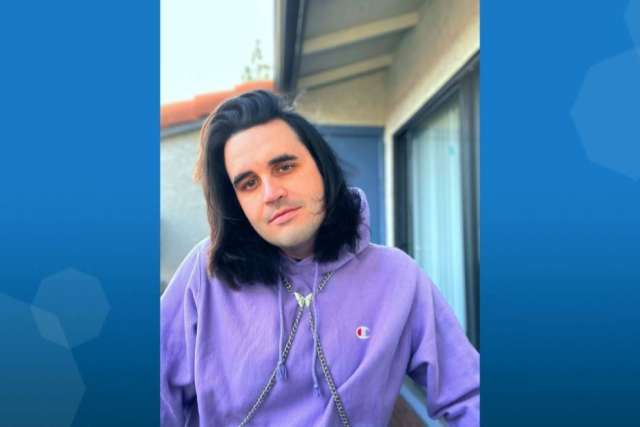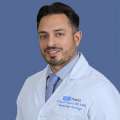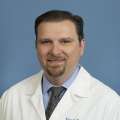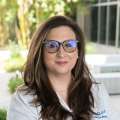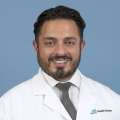Photo: Kyle McEwen
When Kyle McEwen, 26, started experiencing extreme stomach pains more than a year ago, he hoped that maybe it was just the flu.
But as the symptoms continued for weeks, he made an appointment with a general practitioner near his home in Thousand Oaks. That doctor concluded he was probably just suffering from anxiety and perhaps irritable bowel syndrome.
"She prescribed me anti-anxiety medication and thought that was it," he said. "I admit that I have anxiety, but I did not feel like anxiety was causing my stomach issues – it didn't add up."
Determined to find answers, McEwen made an appointment with Dr. Michael Albertson, a UCLA gastroenterologist who ordered a colonoscopy, a procedure that’s rare for a patient so young.
It turned out that McEwen had an adenocarcinoma – a malignant tumor in his rectum.
“Even I could look at the images and tell that something wasn’t right,” he said. “There was this black object that obviously did not belong there.”
McEwen’s diagnosis underscored a trend that doctors have been tracking in recent years: More younger people are developing colorectal cancer.
The problem has become so pronounced that the U.S. Preventive Services Task Force in 2021 lowered the recommended age for colorectal cancer screenings to 45. The American Cancer Society estimates there will be 106,180 new cases of colon cancer and 44,850 new cases of rectal cancer in the U.S. in 2022.
McEwen is now undergoing treatment from a multidisciplinary team at UCLA Health.
Following radiation, chemotherapy and surgery, he’s optimistic that he can win the battle against colorectal cancer and look forward to a healthy future.
"I’m definitely glad that I pushed for my own health, when something just didn't feel right," he said. "It has been an awful lot to go through, that's for sure. But I am one of the lucky ones, and I feel really grateful to have had a whole team that was so dedicated to immediately taking care of this for me."
For such a serious condition, it takes a team of physicians to execute the best possible treatment, said UCLA's Kevork Kazanjian, MD, a colorectal surgery specialist treating McEwen.
"Obviously, the dramatic aspect that really stands out in Kyle's case of colorectal cancer is his young age," Dr. Kazanjian said.
Doctors such as Kazanjian are searching for an explanation as to why cases are on the increase among younger people.
"Our traditional thought that colorectal cancers only afflict older patients is just not the case anymore," Kazanjian said. "What we do know is that these cancers really don't care how young or old you are. Kyle is pretty much on the extreme younger end of this phenomenon.”
That added to the shock McEwen felt when he initially was diagnosed.
Stunned by the news
"It rocked my world,” he said. “When you are young, you just don’t think that something this serious is going to happen to you. It definitely makes you feel your mortality, and my imagination kind of ran wild with all of the disturbing possibilities.”
His parents were also stunned. “There was a really long and awkward silence because they did not know what to say,” McEwen said.
“When I got home that day and told my husband, I just started crying because I had no idea what was going to happen with all of this,” he said. “But he helped me get through it every step of the way. Support from your family and friends is so priceless."
The treatment
McEwen began his treatment at UCLA Health in 2021. One advantage of his age was that he could tolerate treatment better than many older patients.
"They basically compressed a month of radiation treatments into five days for me," he said.
Ann C. Raldow, MD, a member of the Jonsson Comprehensive Cancer Center and the gastrointestinal radiation oncologist who treated McEwen, said his treatment program involved three phases.
The first two phases consisted of radiation and then chemotherapy, to shrink the tumor and pave the way for the third phase of surgery to successfully remove it.
Though McEwen dreaded the side effects of radiation and chemotherapy, he was impressed with how quickly and effectively his treatments progressed.
"The doctors told me I would just have to fight through it so we could kill the cancer, so that’s what I did.,” he said.
Dr. Raldow said radiation treatments have become increasingly refined in recent years to minimize the negative impacts on the patient’s health while improving the focus on killing cancer cells.
"The radiation itself is very targeted, so that we can radiate the cancer and spare the healthy tissue," Dr. Raldow said. "This technology is constantly advancing."
Sidharth R. Anand, MD, a member of the Jonsson Comprehensive Cancer Center, was the gastrointestinal medical oncologist who treated McEwen. He said the doctors were pleased with the outcome.
"Kyle tolerated his treatment, called ‘Total Neoadjuvant Therapy,’ well,” Dr. Anand said. “Though he had a lot of anxiety around his diagnosis and treatment, he demonstrated remarkable courage throughout. We also involved our Simms Mann integrative oncology team in his care as part of a whole team effort.”
The next step for McEwen will be another surgery to reconnect his plumbing from the ileostomy, an opening doctors made in his abdominal wall to drain intestinal wastes.
"Surprisingly, that part was not as bad to deal with as I thought it would be," McEwen said of the ileostomy. "I was not looking forward to it, but it really hasn't been a problem. Of course, I am looking forward to the reattachment surgery and being done with all that."
Dr. Anand said he will then monitor his patient for five years, and "extremely closely for two to three years,” watching for any signs of cancer returning. He will use lab tests such as tumor markers and CT scans, as well as a relatively new technology called circulating tumor DNA (ctDNA).
It takes a team
The teamwork of physicians involved in McEwen's treatment is typical of the multidisciplinary approach UCLA uses to treat cancer patients, Dr. Kazanjian said.
"Often the process will involve physicians that the patient never sees, but who are involved in the diagnosis and treatment that we pursue for the best outcome for the patient," he said.
He said he tells patients to think long-term about beating their cancer and for future prevention, especially recommending healthier diet choices and exercise.
"We try to tell them that the process of treatment is a marathon, not a sprint," Dr. Kazanjian said. "It's a journey, a multi-step process, where you don't just go in and get one thing fixed and you're done."
Dr. Anand, Dr. Raldow and Dr. Kazanjian all recommend the "Mediterranean diet," with more fresh vegetables, and less meat and processed foods than typically found in the American diet.
Advocate for yourself
Dr. Kazanjian encourages patients to be assertive, like McEwen was, insisting that they get answers from their doctors. “It pays to be your own advocate, when you know that something just does not feel right with your health,” he said.
McEwen recommends that everyone, regardless of age, lean toward finding out the cause of any pain or other symptoms – and seek help from medical professionals.
“When I first started researching my symptoms, Google became my best friend and worst enemy,” he said. “I imagined all kinds of diseases, especially anything that any family members had gone through. But honestly, it’s very hard to diagnose yourself. It is better to have really good doctors help you to figure out the problem.”
Despite the ordeal of the treatment that was to come, McEwen said that after his cancer diagnosis sunk in, he could find some calm in knowing that the root of his pain could be addressed medically and that eventually he would find relief.
"Yeah, it's scary to think about having a serious medical issue, but it's always better to find out and know what it is than to be left in the dark," he said. "What I found out is that the technology has come so far, and the treatments for cancer are so amazing, that it might not be as bad as your worst fears.”
Learn more about colorectal cancer screening options at UCLA Health.
Tina Daunt is the author of this article.
